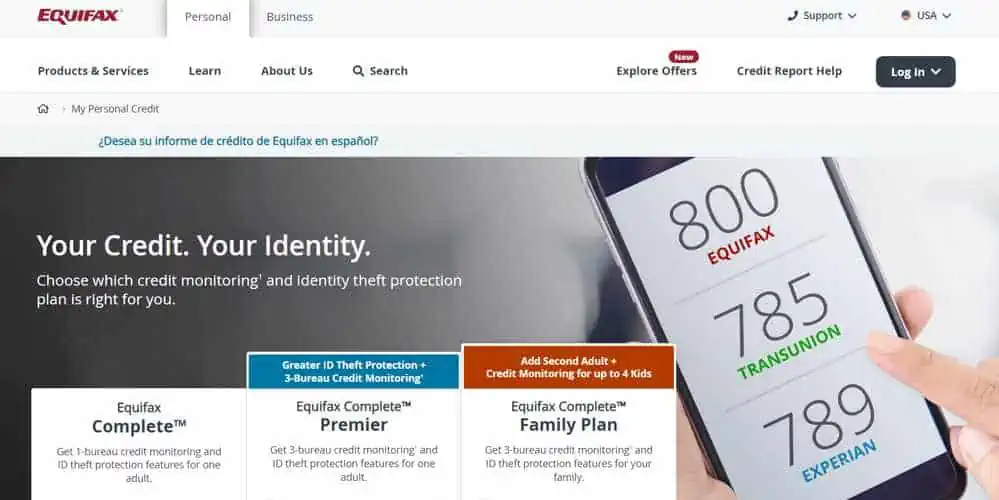Dive into the world of credit reporting and discover what distinguishes TransUnion vs Equifax. It’s a common misconception that all credit scores are created equal, but pulling your credit report from these two bureaus can result in significantly different scores. But why is this the case?
This comprehensive guide will illuminate TransUnion and Equifax’s distinct credit score calculation methods and discuss their differences.
What Services do TransUnion and Equifax Provide?
Equifax and TransUnion are two of the most well-known credit bureaus. Credit bureaus, also known as credit reporting agencies, are essential in determining a person’s creditworthiness. They collect information from various sources, including lenders, utility companies, and others, using a person’s Social Security number, credit report, and other identifying information. They use this information to generate credit reports and scores, two distinct entities.
Credit report
A credit report is essentially a record of a person’s credit history, including the date credit accounts were opened, account balances, credit limits, payment history, bankruptcies, and debt collections. These reports serve as the foundation for credit scores.
Credit score
It’s worth noting that credit scores are calculated differently by different credit bureaus. While most lenders use FICO or VantageScore credit scores, these credit repair companies use their models based on credit bureau reports, resulting in variations in credit scores.
Difference: TransUnion vs Equifax
During application processes, it’s common practice for businesses to sell customers’ personal information to lenders, banks, debt collectors, and other companies eager to evaluate your creditworthiness and financial history. You need to keep in mind, though, that your credit reports from various credit bureaus can differ.
While Equifax and TransUnion both employ proprietary credit-scoring models, they may use similar factors to determine credit scores. Due to the fact that the major credit bureaus don’t always receive the same information from lenders and creditors, this can result in minor variations in the data used to generate the scores. Additionally, it’s crucial to know that some creditors and lenders may favor credit scores tailored to particular industries.
Different Metrics and Algorithms
In comparing TransUnion and Equifax, we need to note that both credit reporting agencies have their own proprietary algorithms to determine credit scores. Their system differs in two sections:
Weightings for Accounts
One of the key differences between TransUnion and Equifax is the weight assigned to different accounts. Equifax places different weights on active accounts compared to accounts that have been closed for four years. On the other hand, TransUnion places more emphasis on an individual’s employment history when calculating their credit score.
Credit History Lengths
Another notable difference between the two credit bureaus is the length of credit history used in their calculations. TransUnion uses a 7-year credit history, while Equifax calculates based on a 6-year and 9-month time interval.
Different Credit Information
Credit information availability is one factor influencing the disparity between TransUnion and Equifax credit ratings. Some lenders might only report to one or two credit reporting agencies, and not all credit reporting agencies will have complete information on you. Additionally, lenders could send updates to several agencies at various intervals, resulting in different credit information being listed on your reports.
Different Time Periods
A credit score is a snapshot of your credit profile at a certain point in time, another factor contributing to the variance in credit scores. When comparing credit scores from several credit bureaus, reaching them from the same time period is crucial because credit ratings can vary over time.
How Does TransUnion Calculate Credit Scores

TransUnion calculates credit scores using the VantageScore method, ranging from 300 to 850. The scores are classified as follows:
Very Poor: 300 – 499
Poor: 500 – 600
Fair: 601 – 660
Good: 661 – 780
Excellent: 781 – 850
The following factors are considered in this scoring model:
Payment history (accounting for 40%)
Credit length and type (21%)
Utilization of credit (20%)
Total credit balance (11%)
Recent credit behavior (5%)
Available credit (3%)
How Does Equifax Calculate Credit Scores

Scores are then assigned as follows:
Poor: 280 – 559
Fair: 560 – 659
Good: 660 – 724
Very Good: 725 – 759
Excellent: 760 – 850
Equifax uses a scoring model similar to the FICO method, and its credit scores range from 280 to 850. The following elements are taken into consideration:
Payment history (35%)
Utilization of credit (30%)
Credit history (15%)
Credit mix (10%)
New credit accounts (10%)
Information Used to Calculate Credit Scores
Five main factors—payment history, credit utilization, duration of credit history, categories of credit used, and most recent credit inquiries—are used to determine credit scores. Making wise choices about one’s financial situation requires understanding how these variables affect credit ratings.
Payment History
Payment history is an important factor in determining credit scores, reflecting a person’s propensity to make on-time debt payments. Due to the increased risk of default, late or missed payments can be significantly lower a credit score. Due to the importance of payment history in determining credit score calculations, it is crucial to make all payments on time, every time.
Credit Usage
The ratio of a person’s used credit to their available credit is referred to as credit utilization. Financial strain may be indicated by a high credit utilization rate, which could also affect credit scores. A person’s credit utilization rate is 90%, for instance, if they use $9,000 out of a $10,000 credit card limit. It is advised to keep credit utilization rates below 30% because it is vital in determining credit scores.
Length of Credit History
The length of credit history plays a significant role in determining credit scores. As it shows a consistent pattern of prudent money management, a more extended history of acceptable credit usage might boost a credit score. On the other hand, a short credit history may be a sign of inexperience with credit management and may result in a lower credit score.
Credit Use
Credit usage, including the use of credit cards, loans, and mortgages, can have an impact on credit ratings. A diverse range of credit types can show sound money management and possibly raise a credit score. A variety of credit cards and loans, for instance, can show that you can handle various sorts of debt.
Recent Credit Inquiries
Recent credit inquiries can also impact credit scores. A credit score could be lowered if there are too many queries in a short period, which may suggest a higher risk of taking on additional debt. Limiting credit inquiries is crucial because each one has the potential to reduce a credit score by a few points.
Which One is the Most Accurate?
It’s a prevalent misperception that credit ratings from one bureau are necessarily more accurate or helpful than those from another. The truth is that a lender’s preference for a particular score may differ, but this does not make it superior.
It’s crucial to note that every loan circumstance is different and takes a variety of things into account, so a lender’s choice of credit report and score should be considered in that light.
Ways to Check Credit Score
The prevalence of identity theft and credit fraud makes it more crucial than ever to check your credit score regularly. Since inaccurate information on your credit report is frequently the first indication of credit fraud, routine monitoring is essential for spotting potential problems. Every 12 months, consumers are entitled to a free credit report from each major credit bureau under federal law.
Equifax Credit Score
Enrolling in Equifax Complete is one of the most cost-effective ways to keep track of your Equifax credit score. The monthly fee for this service is $9.95, giving you continuous access to your Equifax credit score. You can also register for Equifax Core Credit for one free monthly credit check.
TransUnion Credit Score
The TransUnion Credit Monitoring service costs $29.95 per month, which makes monitoring your TransUnion credit score a little more expensive. But in addition to these features, this service also offers email alerts, identity theft insurance, and the option to freeze your credit report.
3rd Party Apps
If the annual check is too long for you, you can check your credit score monthly with free apps like Credit Karma, Borrowell, Credit Sesame, NerdWallet, and others. Note that not every one of these apps works with your particular credit reporting bureau.
Conclusion
Recognize the differences between Equifax and TransUnion credit reports, as each company generates credit scores using a different algorithm. These scores could be other, but that doesn’t mean they’re all wrong. Instead of comparing the TransUnion and Equifax scores, lenders frequently concentrate on the average credit score from various bureaus.
To ensure accuracy and maintain knowledge of your credit standing, it is critical to routinely review your TransUnion and Equifax credit reports to ensure accuracy and maintain knowledge of your credit standing. Utilizing the data offered by these credit reporting agencies can be extremely important to your effort to build credit.
A good credit score can significantly improve your chances of obtaining business funding in the future by enhancing your credit score across all major credit reporting bureaus. Therefore, you should never undervalue the importance of maintaining your knowledge and managing your credit history.

